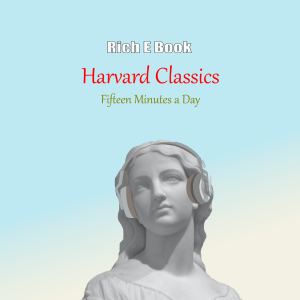
279.5K
Downloads
736
Episodes
Former President of Harvard University Charles W. Eliot wrote in his introduction to the Harvard Classics, "In my opinion, a five-foot shelf would hold books enough to give a liberal education to any one who would read them with devotion, even if he could spare but fifteen minutes a day for reading." Here you are, you can easily listen to his entire 15-minutes-a-day study guide while commuting to and from work (most of us spend far more than 15 minutes a day commuting each day), doing mundane work in the office, washing dishes at home, or doing most of the things day in and day out. It is so easy, so entertaining, and so educational that they can be listened to again and again, until they permeate into our own thinking and into our characters. Perhaps, in one year's time, you will become someone you barely recognize, all for the better. Who knows?
-- Rich E Book
Former President of Harvard University Charles W. Eliot wrote in his introduction to the Harvard Classics, "In my opinion, a five-foot shelf would hold books enough to give a liberal education to any one who would read them with devotion, even if he could spare but fifteen minutes a day for reading." Here you are, you can easily listen to his entire 15-minutes-a-day study guide while commuting to and from work (most of us spend far more than 15 minutes a day commuting each day), doing mundane work in the office, washing dishes at home, or doing most of the things day in and day out. It is so easy, so entertaining, and so educational that they can be listened to again and again, until they permeate into our own thinking and into our characters. Perhaps, in one year's time, you will become someone you barely recognize, all for the better. Who knows?
-- Rich E Book
Episodes

Wednesday Oct 27, 2021
Introductory Note: Buddha
Wednesday Oct 27, 2021
Wednesday Oct 27, 2021
Introductory note on Buddha (Volume 45, Harvard Classics)

Wednesday Oct 27, 2021
Buddhist Writings
Wednesday Oct 27, 2021
Wednesday Oct 27, 2021
Siddhartha Gautama, who became the god Buddha, renounced the world and spent seven years in meditation. Then one day, while sitting under a fig tree, he became inspired with exalted and sublime conceptions of life and death. The rest of his life was spent in teaching and converting mankind. (Volume 45, Harvard Classics)

Tuesday Oct 26, 2021
Introductory Note: Benjamin Franklin
Tuesday Oct 26, 2021
Tuesday Oct 26, 2021
Introductory note on Benjamin Franklin (Volume 1, Harvard Classics)

Tuesday Oct 26, 2021
The Autobiography of Benjamin Franklin (Ch. 2), by Benjamin Franklin
Tuesday Oct 26, 2021
Tuesday Oct 26, 2021
Poor at twenty, rich at forty, internationally famous at fifty. Benjamin Franklin once walked the streets of Philadelphia alone, poor, and with no education. Yet he rose to be a leader because he learned the secret of careful reading. (Volume 1, Harvard Classics)
Franklin made U. S. plenipotentiary in France, Oct. 26, 1778.

Monday Oct 25, 2021
Introductory Note: Thomas Babington Macaulay
Monday Oct 25, 2021
Monday Oct 25, 2021
Introductory note on Thomas Babington Macaulay (Volume 27, Harvard Classics)

Monday Oct 25, 2021
Machiavelli, by Thomas Babington Macaulay
Monday Oct 25, 2021
Monday Oct 25, 2021
After the publication of Machiavelli's "The Prince," the Sultans became more addicted to strangling their brothers, tyrants became more merciless, and murderous plots increased. The influence of that book, as Macaulay points out, spread over Europe and Asia. (Volume 27, Harvard Classics)
Thomas Babington Lord Macaulay born Oct. 25, 1800.

Sunday Oct 24, 2021
Introductory Note: Aeschylus
Sunday Oct 24, 2021
Sunday Oct 24, 2021
Introductory note on Aeschylus (Volume 8, Harvard Classics)

Sunday Oct 24, 2021
Agamemnon, by Aeschylus
Sunday Oct 24, 2021
Sunday Oct 24, 2021
Cassandra knew through a prophetic vision that a sword would pierce her heart. Agamemnon, her captor, took her to his home where an avenging wife, Clytemnestra, awaited. The tragedies of the doom that requited the sins of the House of Atreus are among the most powerful ever written. (Volume 8, Harvard Classics)

Saturday Oct 23, 2021
Introductory Note: Plutarch
Saturday Oct 23, 2021
Saturday Oct 23, 2021
Introductory note on Plutarch (Volume 12, Harvard Classics)

Saturday Oct 23, 2021
Parallel Lives of Famous Greeks and Romans (Cæsar), by Plutarch
Saturday Oct 23, 2021
Saturday Oct 23, 2021
When only a boy, Cæsar was captured by pirates. While awaiting ransom he entered into every sport and game with them. Once freed, he quickly returned with forces that captured the outlaws. Then he took deliberate revenge. (Volume 12, Harvard Classics)
